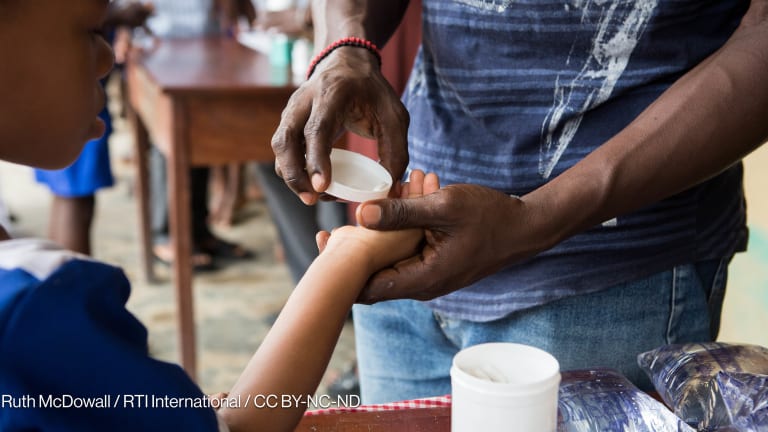
The inclusion of a water, sanitation, and hygiene indicator in the World Health Organization’s new neglected tropical disease roadmap 2021-2030 signals a shift in attitude toward WASH’s importance, but will require even greater coordination, experts say.
NTDs are a group of 20 communicable diseases — including leprosy, lymphatic filariasis, and schistosomiasis — which, despite often being preventable, have debilitating and sometimes fatal consequences. According to WHO, the 20 diseases affect more than 1.7 billion people worldwide. Those with poor access to quality health services, clean water, and sanitation are at increased risk.
The latest roadmap, launched last week at a virtual event, lays out a guide to achieve a 90% reduction in the number of people requiring NTD treatment, the elimination of at least one NTD in 100 countries, the eradication of dracunculiasis — or guinea worm — and yaws, and a 75% reduction in disability-adjusted life years. Among 70 indicators in the roadmap, one focuses on WASH and achieving 100% "access to at least basic water supply, sanitation, and hygiene in areas endemic for NTDs” by 2030.
“This is a paradigm shift for the NTD and broader health community in terms of being more cross-sectoral and this really shows there is a changing focus among the NTD community toward these environmental determinants of health,” said Kelly Bridges, senior associate at Global Water 2020, adding that it’s a call to action for implementing organizations and donors toward coordination.
“I think we’ve been very much operating in silos to an extent … The left hand doesn’t know what the right hand is doing.”
— Joy Ruwodo, director of public affairs, The END FundThe prior roadmap, launched in 2012, had no such indicator and lacked a “real commitment” to WASH, said Yael Velleman, director of policy and communications at the SCI Foundation, a charity focussed on tackling schistosomiasis and soil-transmitted helminthiasis. Developed through extensive global consultation, it encourages a shift in approach from vertical disease programs to cross-cutting approaches based on the needs of patients and communities. Other cross-cutting approaches to NTD interventions detailed in the roadmap include nutrition and education.
Calling the new roadmap “a significant departure from business as usual,” Velleman said that the prioritization of WASH by WHO means there’s now a mandate to act.
Wanted: A 'modest' $3.6B to give hospitals access to water
One in 4 health care facilities worldwide still lack access to basic water facilities. A new report provides the first cost estimate to fix it.
WASH is a key component when it comes to preventing certain NTDs. Increased hygiene and hand-washing is often the best weapon against such diseases, while access to clean water can prevent the contraction of waterborne NTDs such as trachoma, STHs, and onchocerciasis.
Joy Ruwodo, director of public affairs at The END Fund — a private philanthropic initiative fighting the five most common NTDs — described incidents where communities are found to have a higher prevalence of an NTD despite initial mass drug administration because people would still be using the same water source that infected them.
“It’s impossible to achieve impact on NTDs without working on WASH at [the] same time,” Velleman said.
So why has it taken until now to openly acknowledge WASH as part of the NTD movement?
Bridges blamed a lack of evidence on the effectiveness of WASH as an NTD intervention.
But gains made since the London Declaration on NTDs, which came into effect in 2012, help to make the case, Ruwodo said. Today 600 million fewer people are at risk of NTDs than a decade ago and 42 countries have eliminated at least one NTD. “Imagine how much more can be achieved if we deal with WASH access … If we’re wanting to accelerate progress and get to a point of breaking transmission and elimination, then we certainly have to accelerate our efforts in WASH,” she said.
COVID-19 has helped to drive this message home further while highlighting the fragility of health systems and fragmentation of the sector, she added.
“I think we’ve been very much operating in silos to an extent,” Ruwodo said, For example, in certain countries, the department of health tends to operate separately to the department of water and sanitation. “The left hand doesn’t know what the right hand is doing.”
The roadmap calls for NTD programs to share data on endemicity of WASH-related NTDs with water and sanitation authorities, for WASH programs to direct investment and interventions toward NTD hotspots, and for joint advocacy, awareness-raising, and behavior-change promotion to be conducted.
“The disease mapping that the health sector is doing should inform the investments of water infrastructure so the investments are being placed in the areas where there is disease prevalence,” Ruwodo said.
Aside from the roadmap, Bridges said other initiatives — including an upcoming Global WASH Strategy for the Control and Elimination of NTDs, expected to launch later this year, and NTD NGO Network’s WASH-NTD guide for program managers, which launched in 2019 — have helped to generate more enthusiasm around WASH in the NTD community.
“Collaboration on WASH and NTDs works and pays off in both sectors so let’s do more of it, let's dedicate resources to it, and it’s a win-win situation,” Velleman said.






